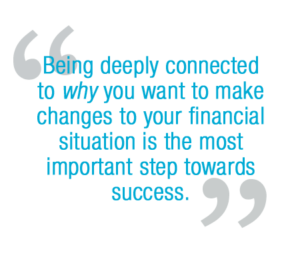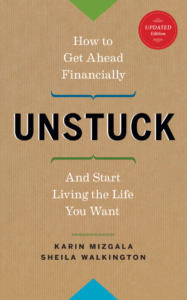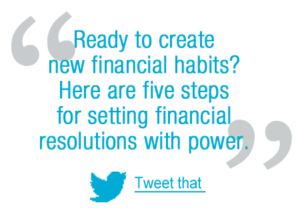By Sheila Walkington, Co-founder and CFO Money Coaches Canada

A new year has begun, and after weeks of holiday spending, many of us are ready to pull-up our socks and create new financial habits. Maybe we resolve to lower our debt this year, or increase our savings, or some other generic, feel good intention.
That’s the problem with most New Year’s resolutions; their reliance on magical thinking. The belief that you will wake-up changed on January 1st, your old habits having melted away. And for a few days, even weeks, it feels like that’s true. But without something more than a wish to support your change, your plans collapse. We’ve all been there.
It doesn’t have to be that way. There is a formula that can increase your chances of making change, at the New Year, or any time. Five steps that can turn a generic resolution into an intention that you feel connected to and invested in.
Step One: Dig Deep to Find Your “Why”
It’s easy to look at your RRSP contributions and think, I should start saving more. Or stare at your Line of Credit statement and decide; I should work on paying this down faster. The problem with both those statements is the word should. Should is an oppositional word, the moment our mind hears should, we know we aren’t talking about something we really want to do. We’re talking about something that we know is in our best interest, but usually feels complicated, overwhelming and boring.
 Being deeply connected to why you want to make changes to your financial situation is the most important step towards success. When you truly know why you want something, the word should falls away.
Being deeply connected to why you want to make changes to your financial situation is the most important step towards success. When you truly know why you want something, the word should falls away.
But there are two things to determine before you uncover your deep why.
What is your vision for your life? How do you want to live today and what do you hope for your future? You can download this worksheet, “If money wasn’t an issue, what would you aspire to do?” These nine questions will help you uncover what matters to you. Take your time with this; it’s valuable information for yourself.
Are you motivated by fear or reward? Everyone is different. Most people tend to be mostly fear or mostly reward oriented, but everyone has the capacity for both. It can often depend on the goal. Knowing which one motivates you more can impact your success. For example, here is the same goal, but reframed from different motivational perspectives:
- Reward: I want to have X amount of money in retirement so that I am free to travel.
- Fear: I want to have X amount of money in retirement so that I am not a burden to my children.
Understanding your motivations will help you make your why stronger. You may find your whys include elements of fear and reward.
Now, armed with a vision for the life you want and an understanding of what motivates you, create detailed financial resolutions that have meaning and energy behind them.
Instead of: This year I will pay down my debt and get a handle on my spending.
Try: My debt is holding me back from being able to take a trip to Italy and it’s keeping me up at night. I am going to put my happiness first and increase my debt payments by X amount. I will be able to do this by spending less on impulse buys that ultimately make me feel guilty and frustrated. I will keep pictures of Italy on my phone so that I can look at those when I am tempted to overspend.
Step Two: Take Your Initial Goal Down a Notch
In the excitement of making change, we often overestimate what we’ll be able to do. This would be OK if we were happy with making progress and didn’t beat ourselves up emotionally for “failing,” if things don’t go exactly as planned.
We see this often with exercising. We decide to hit the gym five times a week, but when we end up going only three times, we feel like we’ve failed, and that can be the beginning of the end for our commitment to exercise more.
 If instead, we decided to build the habit of going to the gym at least twice a week—and we actually went three times—we’d feel like we were surpassing our expectations, and we’d be more motivated to continue building the habit. Yet in both cases we went to the gym three times.
If instead, we decided to build the habit of going to the gym at least twice a week—and we actually went three times—we’d feel like we were surpassing our expectations, and we’d be more motivated to continue building the habit. Yet in both cases we went to the gym three times.
This can happen with financial resolutions too. In your excitement to make change you may be setting yourself up with unreal expectations. It’s better to build your new habits than to expect overnight change and perfection. Set goals that you know you can achieve. You can tweak them as you build momentum.
Step Three: Have a Plan with Juice
Most people make resolutions that are declarations of what they are going to do. But unless there is a plan for how something is going to be done, simple declarations float away in the wind.
 Some people feel very comfortable creating their own plans, be it for nutrition, exercise, or finance. If that’s you—great. Make your plan as detailed as you can, using specific money amounts and timelines. Check in with your plan at least monthly, but weekly or even daily, may work better especially as you establish new habits.
Some people feel very comfortable creating their own plans, be it for nutrition, exercise, or finance. If that’s you—great. Make your plan as detailed as you can, using specific money amounts and timelines. Check in with your plan at least monthly, but weekly or even daily, may work better especially as you establish new habits.
If you are unsure how to make a spending and savings plan, you can find lots of practical, action-oriented advice in our book Unstuck How to Get Ahead Financially and Start Living the Life You Want. Or you can speak to a financial advisor or Money Coach if you want personal guidance.
A plan ensures that the actions you take toward your resolution are focussed and meaningful. But a plan doesn’t guarantee that you will take action. That’s the juice. Your initial reaction to your plan may be that it looks hard and not fun. But that changes the moment you see the plan as the engine and your why as the fuel (or juice) that powers it. It’s the juice that keeps you excited through the challenges.
Step Four: Focus on Every Win and Track Your Progress
In step three, I likened your plan to an engine with your why as the fuel. But you don’t fuel an engine only once. You have to keep your motivation tank full. Every time you work your plan, make a smart money decision, or break a bad money habit, congratulate yourself and write your victory down.
Every time you applaud yourself you strengthen your resolve, but there will inevitably come a point when you feel discouraged. That’s when your list of victories, no matter how small, can remind you how much you have changed and encourage you to keep going. It’s also good to have your goal and your why written down for reviewing in times of struggle. In fact, reviewing your goal even when things are going well is important to keeping yourself engaged and excited.
Step Five: Have a Support Network
Some folks like to declare their goals on social media and even write blogs about their progress. That’s probably too much for most people. It isn’t necessary to bring the whole world into your goals, but having support can be helpful.
 It can be tiring to be your only cheerleader. If you’re in a relationship, it probably makes sense to be working on financial goals together. But that doesn’t mean you have to share a why. Each person should have a why that has meaning for them.
It can be tiring to be your only cheerleader. If you’re in a relationship, it probably makes sense to be working on financial goals together. But that doesn’t mean you have to share a why. Each person should have a why that has meaning for them.
But beyond your relationship, you may want to have a close friend or two on board. The key is to choose yay-sayers not nay-sayers into your circle.
If you intend to make substantial financial changes this year, you might want to consider the benefits of a Money Coach. A Money Coach has only your success as their goal. They can help you build your plan, help you discover your why, and offer support and advice for staying on track.
This Can Be a Great Financial Year
I’ve given you five steps, but they are really five pieces that fit together and create success.
- Know what you want and the deep reasons you want it
- Set realistic goals
- Have a plan that drives you forward
- Honour and track all your progress
- Have support so you don’t have to go it alone
If you look at the times your resolutions faded away, one or more of those pieces were probably absent. Each piece is fairly simple, but together they are very powerful.
May 2019 be the year you breathe easy, and take control.



Great tips, Sheila! I especially like number five. It’s much easier to accomplish our financial goals when we have help.